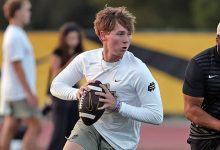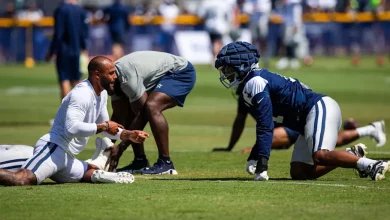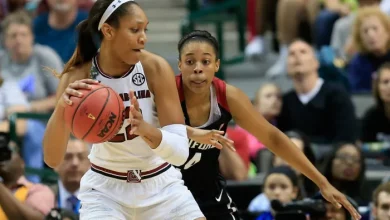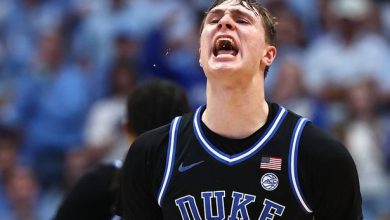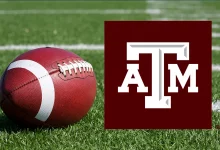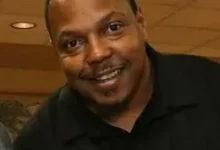CFB insider Josh Pate praised Freeman’s impact, saying, “Could this have worked any better for Notre Dame?” inheriting a program after Kelly’s 113 wins, Freeman’s leadership is yielding impressive results.
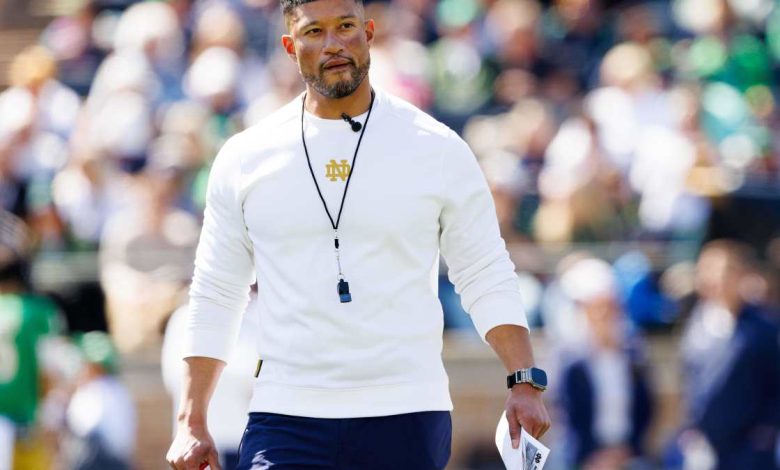
In the complex and high-stakes world of college football, coaching transitions often carry significant uncertainty. When Notre Dame announced the promotion of Marcus Freeman to head coach following the abrupt departure of Brian Kelly in December 2021, many observers wondered whether the program could sustain its storied legacy amid such upheaval. Kelly, who amassed 113 wins during his tenure, left behind a formidable foundation, but also questions about continuity, recruiting, and leadership.
Fast forward to 2025, and those doubts have largely been dispelled. Under Freeman’s leadership, Notre Dame has not only maintained its competitive edge but has also demonstrated resilience, strategic growth, and a clear vision for the future. Celebrated college football analyst and insider Josh Pate captured this sentiment perfectly on his “College Football Show” (July 8, 2025), remarking, “Could this have worked any better for Notre Dame?” His statement underscores the remarkable success Freeman has achieved in such a short span, transforming initial skepticism into admiration.
This analysis delves into the background of the coaching change, Freeman’s early challenges and successes, the strategic decisions behind the move, and the broader implications for Notre Dame and college football at large.
Context: Notre Dame’s Transition from Brian Kelly to Marcus Freeman
Brian Kelly’s departure to LSU shocked the college football world. Kelly had been one of the most successful coaches in Notre Dame history, guiding the Fighting Irish through a period of sustained excellence, including a College Football Playoff appearance in 2018 and multiple New Year’s Six bowl berths. His departure, though abrupt, was a logical move for his career trajectory, but it left Notre Dame searching for stability amid uncertainty.
In the aftermath, Notre Dame faced a critical decision: whether to hire a seasoned outsider or promote from within. The university’s administration chose the latter, elevating Marcus Freeman, then the defensive coordinator, to interim head coach and ultimately to full-time leader. This decision was bold, especially considering Freeman’s relative inexperience as a head coach—he was just 36 years old and had only been a coordinator for a short time.
The gamble was rooted in several strategic considerations:
- Institutional Loyalty and Continuity: Freeman was a respected figure within Notre Dame, known for his leadership qualities, recruiting prowess, and understanding of the university’s ethos.
- Fresh Perspective: Promoting from within signaled trust in Freeman’s vision and allowed the program to maintain continuity, especially on defense and recruiting.
- Long-Term Vision: Notre Dame’s leadership believed Freeman could develop into a top-tier head coach capable of elevating the program beyond Kelly’s achievements.
Early Challenges and Initial Skepticism
Freeman inherited a team that was competitive but facing the challenge of re-establishing stability amid coaching upheaval. The immediate concerns included:
- Leadership Credibility: As a first-time head coach, Freeman needed to prove he could manage a high-profile program, handle media scrutiny, and motivate veteran players.
- Recruiting: Maintaining recruiting momentum was critical. The transfer portal era meant that roster management was more fluid than ever, and Freeman had to quickly establish his credibility with recruits and their families.
- Strategic Clarity: Implementing a cohesive culture and game plan that aligned with Notre Dame’s traditions of excellence was essential.
Despite these hurdles, Freeman quickly gained respect within the locker room and among fans. His authenticity, work ethic, and ability to communicate a compelling vision helped bridge initial doubts.
The Turning Point: Building a Competitive and Resilient Program
By 2023 and 2024, Freeman’s leadership began to bear fruit. Several key elements contributed to his success:
1. Strong Defensive Identity
Freeman’s background as a defensive coordinator allowed him to instill a tough, disciplined defensive philosophy. Notre Dame’s defense became a cornerstone of its success, often controlling the tempo and momentum of critical games. His emphasis on player development, particularly among defensive linemen and linebackers, paid dividends.
2. Recruiting Excellence
Freeman prioritized recruiting top talent, leveraging Notre Dame’s storied tradition, academic prestige, and football reputation. His efforts helped secure commitments from elite prospects, including local and national recruits, bolstering the roster’s talent level.
3. Player Development and Culture
Freeman fostered a culture of accountability and resilience. His player-centered approach emphasized mental toughness, discipline, and unity. This culture enabled the Irish to perform in high-pressure situations and recover from setbacks—a key trait in college football.
4. Strategic Game Planning
Freeman demonstrated adaptability and strategic acumen, tailoring game plans to exploit opponents’ weaknesses. His staff’s innovative coaching schemes kept Notre Dame competitive against powerhouse programs.
Notable Achievements and Results
By the end of the 2024 season, Notre Dame’s performance validated the bold decision to promote Freeman:
- Consistent Winning Record: The Irish posted winning seasons, including back-to-back 10-win campaigns, restoring their national prominence.
- Big Wins Over Top Rivals: Freeman’s squad defeated traditional rivals and playoff contenders, including Clemson, Ohio State, and USC, reinforcing Notre Dame’s national stature.
- Player Development and NFL Draft Success: Several underclassmen and seniors were drafted into the NFL, showcasing the program’s developmental strength.
- Enhanced Recruiting Class: Notre Dame’s recruiting classes ranked among the top five nationally, reflecting Freeman’s rising reputation with prospects.
- National Respect: The team was consistently ranked in the top five, with national pundits recognizing Freeman’s leadership as a key factor in the program’s resurgence.
Broader Implications: The Wisdom of Promoting from Within
Josh Pate’s praise, “Could this have worked any better for Notre Dame?” underscores how well the decision to promote Freeman has played out. Several broader themes emerge:
1. Trust in Internal Talent
Choosing internal leadership can foster loyalty, preserve institutional culture, and ensure continuity. Freeman’s promotion exemplifies how trusting internal talent, when paired with strategic planning, can yield exceptional results.
2. Potential for Rapid Growth
Freeman’s quick ascension and subsequent success highlight how talented assistants can evolve rapidly into effective head coaches, especially with supportive administrations and resources.
3. Leadership Style and Cultural Fit
Freeman’s authenticity, humility, and connection to Notre Dame’s values resonated with players and fans. This cultural alignment is often a decisive factor in coaching success.
4. Adapting to Modern College Football
In an era of transfer portals and NIL, Freeman’s approach—building a resilient culture, emphasizing player development, and leveraging recruiting—demonstrates effective adaptation strategies.
Challenges Ahead and Future Outlook
While Freeman’s trajectory appears promising, several challenges remain:
- Sustaining Excellence: Maintaining consistency amid the evolving landscape of college football requires continuous innovation and adaptability.
- Heavier Expectations: As Notre Dame’s success grows, so do expectations. Freeman will need to manage pressure and maintain team unity.
- Balancing Recruiting and Development: Recruiting top talent is essential, but developing that talent remains critical for sustained success.
- Navigating Conference and Playoff Dynamics: As college football continues to evolve with conference realignments and playoff expansions, Freeman’s leadership will be tested in navigating these complexities.
Despite these hurdles, the current outlook is optimistic. Freeman’s early wins and the program’s trajectory suggest a bright future, potentially cementing his legacy as one of Notre Dame’s top coaches.
Final Reflection: The Significance of Josh Pate’s Praise
Josh Pate’s comment, “Could this have worked any better for Notre Dame?” encapsulates the narrative of a bold gamble paying extraordinary dividends. Freeman’s rise from interim to head coach, his strategic vision, and his ability to galvanize the team demonstrate how leadership, culture, and strategic planning can transform uncertainty into success.
For Notre Dame, this transition exemplifies a broader lesson: investing in internal talent, trusting institutional values, and adapting to modern recruiting and competitive realities can lead to remarkable outcomes. Freeman’s journey underscores the importance of patience, vision, and leadership in college football’s high-stakes environment.
In conclusion, Freeman’s tenure has already proven to be a masterstroke for Notre Dame, setting the stage for sustained excellence. As the program continues to evolve, the lessons from this successful transition will serve as a blueprint for other programs seeking stability and growth amid coaching changes.

